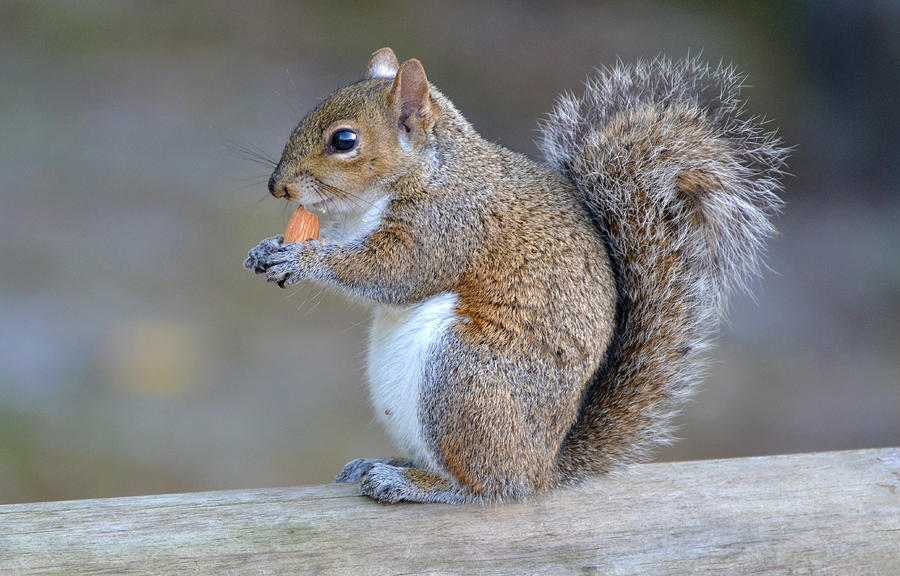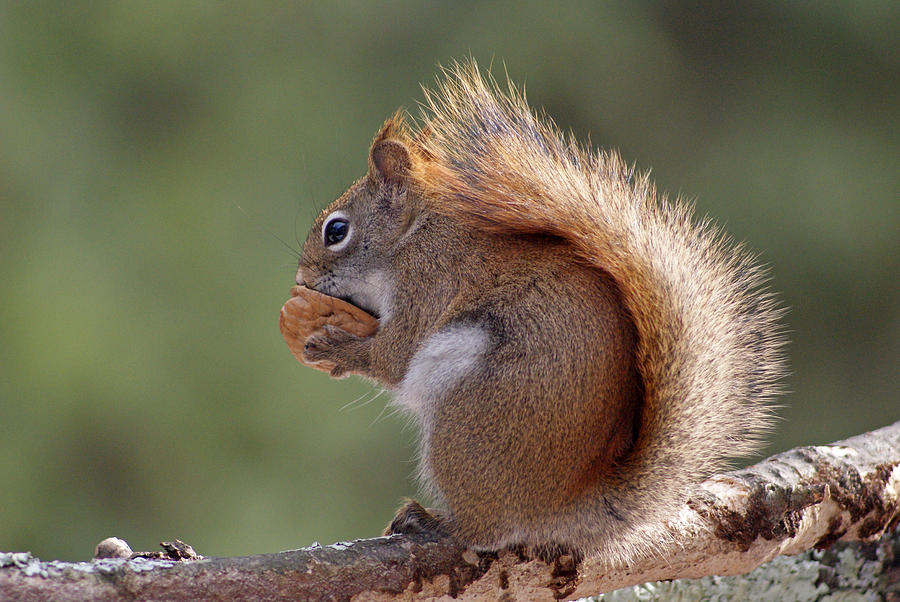Can Squirrels Eat Almonds? A Nutty Guide

Understanding Squirrels and Their Nutty Passion
Squirrels are adorable creatures commonly found in parks, forests, and even urban areas. These small mammals are famous for their bushy tails and their affinity for nuts. They are omnivores, meaning they eat both plants and small animals, but nuts are among their favorite snacks. Squirrels have a remarkable ability to find and store nuts for later consumption. They often stash nuts in various hiding spots, which helps them survive during lean times.
Do squirrels eat almonds?
Now, let's address the big question: Can Squirrels Eat Almonds? The short answer is yes, they can. Almonds are indeed a type of nut, and squirrels are known to enjoy a wide variety of nuts as part of their diet.
Considerations for Squirrels and Almonds
However, there are some important considerations to keep in mind. While squirrels can eat almonds, it's essential to be cautious about how they consume them. Almonds contain a substance called cyanide, which can be harmful in large quantities. In the wild, squirrels may consume almonds as part of their diet, but they are more likely to eat them when other food sources are scarce.
Importance of a Balanced Diet for Squirrels
For squirrels, a balanced diet is crucial for their health and well-being. While nuts like almonds can provide valuable nutrients and energy, they should be just one component of a varied diet. Squirrels also need to consume fruits, vegetables, and protein sources to meet their nutritional needs.
Expert Insights from the National Wildlife Federation
According to the National Wildlife Federation, squirrels are opportunistic feeders, meaning they will eat whatever food is readily available to them. While almonds can be a tasty treat for squirrels, it's important not to rely solely on them as a food source. Providing a diverse range of foods will help ensure that squirrels stay healthy and thrive in their natural habitat.
do squirrels eat almonds? Understanding Squirrel Nutrition

Squirrel Diet Basics
Squirrels are fascinating creatures known for their lively antics and bushy tails. These critters are omnivores, meaning they eat both plants and animals. Their diet can vary depending on the season, which influences the availability of certain foods.
Seasonal Variations in Diet
In the warmer months of spring and summer, squirrels munch on a variety of foods like nuts, seeds, fruits, and insects. These months offer an abundance of fresh vegetation and insects for them to feast on. As the weather cools down in autumn, squirrels focus more on nuts and seeds to prepare for the winter months ahead. During winter, when food becomes scarce, squirrels rely heavily on the nuts they've stored and may also consume tree bark and buds.
Key Components of a Squirrel's Diet
Nuts and Seeds
Nuts and seeds are staple foods for squirrels. They provide essential nutrients like fats, proteins, and carbohydrates, which are crucial for sustaining their energy levels and supporting their active lifestyle. Examples of nuts and seeds that squirrels enjoy include acorns, walnuts, pecans, sunflower seeds, and pumpkin seeds.
Fruits
Fruits are another important part of a squirrel's diet, especially during the warmer months. Fruits provide sugars for quick energy and essential vitamins and minerals. Squirrels are known to feast on a variety of fruits such as berries, apples, oranges, and bananas.
Insects
While not as prominent in their diet as nuts and fruits, insects still play a role, especially during the spring and summer months. Insects are a good source of protein and other nutrients that squirrels need to thrive.
Importance of Fat and Protein
Fat and protein are two key nutrients that play vital roles in a squirrel's diet. Fat provides a concentrated source of energy, which is essential for maintaining their high activity levels, especially during periods of foraging and breeding. Protein is crucial for muscle development, repair, and overall health.
Understanding squirrel nutrition involves recognizing their omnivorous nature and how their diet varies throughout the seasons. Nuts, seeds, fruits, and insects are important components of their diet, providing essential nutrients like fat and protein to support their active lifestyles. By providing a balanced diet that mimics their natural food sources, we can help ensure the health and well-being of these fascinating creatures.
Are Almonds Safe for Squirrels?

Almonds and Squirrels: A Safe Snack Choice
When it comes to squirrels munching on almonds, rest assured, these nuts are generally safe for our furry friends when given in moderation.
Nutritional Benefits of Almonds for Squirrels
1. Healthy Fats:
Almonds are packed with healthy fats, which are essential for squirrels to maintain energy levels and support overall health. These fats help keep their coats shiny and their bodies well-insulated during colder months.
2. Protein Powerhouse:
Squirrels need protein to build and repair tissues, and almonds provide a good source of plant-based protein. This nutrient is crucial for their growth, development, and muscle maintenance.
3. Vitamin and Mineral Rich:
Almonds are not just tasty; they're also loaded with vital vitamins and minerals. These include vitamin E, which acts as an antioxidant, protecting squirrels' cells from damage, and minerals like magnesium and calcium, which contribute to strong bones and teeth.
In moderation, almonds can be a beneficial addition to a squirrel's diet, offering a range of nutrients that support their health and well-being. However, it's important to remember that almonds should only be given as an occasional treat and not as a primary food source. As always, consulting with a veterinarian for specific dietary recommendations is advisable to ensure your squirrel friend stays happy and healthy.
Feeding Almonds to Squirrels: What You Need to Know
Why Considerations Matter
When feeding almonds to squirrels, it's crucial to understand certain considerations to ensure the squirrels' well-being and health. Here's a breakdown of what you need to know:
Choosing the Right Almonds
Unsalted and Unseasoned Almonds
Squirrels thrive on a natural diet, and so unsalted and unseasoned almonds are the best choice for them. These almonds retain their natural nutritional value without any added salts or seasoning that might be harmful to squirrels.
Chopped or Sliced Almonds
Squirrels, like many small animals, might find it easier to manage smaller pieces of food. Therefore, offering chopped or sliced almonds makes it simpler for them to handle and consume their food.
Feeding Practices
Offer Almonds as an Occasional Treat
While almonds can be a tasty and nutritious treat for squirrels, they should not be the main component of their diet. Instead, offer almonds as an occasional treat to supplement their regular food sources.
Avoid Almonds in Shells
Almonds in shells might seem natural, but they pose a significant choking hazard to squirrels. It's best to avoid offering almonds in shells to prevent any potential harm to these small animals.
Overfeeding Concerns
Beware of Overfeeding
While it may be tempting to shower squirrels with treats, overfeeding can lead to dependency on supplemental food sources. Squirrels should primarily rely on their natural foraging instincts to find food, supplemented occasionally with treats like almonds.
When it comes to feeding almonds to squirrels, remember to prioritize their health and well-being. Opt for unsalted and unseasoned almonds, offer them chopped or sliced for easier consumption, and be mindful of overfeeding. By considering these factors, you can ensure that the squirrels in your area stay happy and healthy.
Alternatives to Almonds for Squirrels
Squirrels love munching on nuts, but almonds aren't the only option for these furry critters. Here are some other nutritious alternatives that can keep your squirrel friends happy and healthy:
Acorns
Acorns are a natural favorite for squirrels. These nuts are abundant in the wild and provide a good source of fats, proteins, and carbohydrates for squirrels. Make sure the acorns are ripe and free from mold before offering them to squirrels.
Walnuts
Walnuts are another excellent option for squirrels. They're rich in omega-3 fatty acids, which are essential for maintaining a squirrel's coat and overall health. Just like with almonds, ensure that the walnuts are unsalted before serving them to squirrels.
Hazelnuts
Hazelnuts are packed with nutrients like vitamin E, folate, and healthy fats. Squirrels enjoy cracking open the shells to get to the tasty kernel inside. Remember to provide unsalted hazelnuts to prevent any health issues for the squirrels.
Sunflower Seeds (Unsalted)
Sunflower seeds are a convenient and tasty snack for squirrels. They're high in protein and healthy fats, making them a great alternative to almonds. Opt for unsalted sunflower seeds to avoid any sodium-related health problems for squirrels.
Fruits (Apples, Berries)
Fruits are a refreshing and nutritious treat for squirrels. Apples and berries, such as strawberries and blueberries, are rich in vitamins and antioxidants. Offer them fresh or dried (without added sugars) as a healthy snack option for squirrels.
By incorporating these alternatives into a squirrel's diet, you can provide them with a diverse range of nutrients while keeping their taste buds satisfied.
Conclusion
In conclusion, while almonds are not harmful to squirrels in moderation, it’s important to remember that they are not a natural part of their diet. Offering them as an occasional treat alongside unsalted, chopped options can provide some nutritional benefits without disrupting their natural food sources.
Remember, responsible feeding practices are key. Avoid overfeeding, stick to unsalted and unseasoned options, and consider offering a variety of healthy alternatives like acorns, walnuts, and fruits. This ensures a balanced diet for our furry friends and allows them to continue thriving in their natural environment.
Frequently Asked Questions (FAQ'S)
Q. Do squirrels eat almonds?
Yes, squirrels eat almonds. They are known to forage for various nuts, including almonds, as part of their diet.
Q. Will squirrels eat almonds?
Indeed, squirrels will readily consume almonds as they are attracted to nuts for their nutritional value and energy content.
Q. Are almonds safe for squirrels?
Almonds are generally safe for squirrels to eat in moderation. However, it's essential to ensure they are unsalted and not coated in any flavorings.
Q. Can I feed squirrels almonds?
Yes, you can feed almonds to squirrels as an occasional treat. Remember to offer them in moderation and avoid any seasoned or flavored varieties.
Q. Can squirrels eat almonds in the shell?
While squirrels can crack open almond shells, they typically prefer shelled almonds as they are easier to consume.
Q. Can squirrels eat raw almonds?
Yes, squirrels can eat raw almonds. Raw almonds provide a natural source of nutrients for squirrels in their diet.
Q. Can squirrels eat walnuts and almonds?
Yes, squirrels can eat both walnuts and almonds. These nuts are nutritious and provide essential fats and proteins for their diet.
Q. How many almonds can a squirrel eat?
Squirrels may eat several almonds at a time, but it's essential to provide them in moderation as part of a balanced diet alongside other foods.
